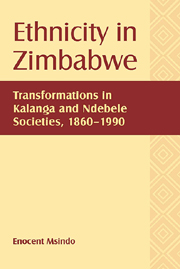Book contents
- Frontmatter
- Contents
- List of Illustrations
- Acknowledgments
- List of Abbreviations
- Note to the Reader
- Introduction
- 1 Ethnicity and Identities in Matabeleland
- 2 Domination and Resistance: Precolonial Ndebele and Kalanga Relations, 1860–93
- 3 Remaking Communities on the Margins: Chieftaincy and Ethnicity in Bulilima-Mangwe, 1893 to the 1950s
- 4 Ultraroyalism, King's Cattle, and Postconquest Politics among the Ndebele, 1893 to the 1940s
- 5 Language and Ethnicity in Matabeleland
- 6 Contests and Identities in Town: Bulawayo before 1960
- 7 Complementary or Competing? Ethnicity and Nationalism in Matabeleland, 1950–79
- 8 Postcolonial Terror: Politics, Violence, and Identity, 1980–90
- Conclusion
- Notes
- Selected Bibliography
- Index
- Rochester Studies in African History and the Diaspora
Note to the Reader
Published online by Cambridge University Press: 05 February 2013
- Frontmatter
- Contents
- List of Illustrations
- Acknowledgments
- List of Abbreviations
- Note to the Reader
- Introduction
- 1 Ethnicity and Identities in Matabeleland
- 2 Domination and Resistance: Precolonial Ndebele and Kalanga Relations, 1860–93
- 3 Remaking Communities on the Margins: Chieftaincy and Ethnicity in Bulilima-Mangwe, 1893 to the 1950s
- 4 Ultraroyalism, King's Cattle, and Postconquest Politics among the Ndebele, 1893 to the 1940s
- 5 Language and Ethnicity in Matabeleland
- 6 Contests and Identities in Town: Bulawayo before 1960
- 7 Complementary or Competing? Ethnicity and Nationalism in Matabeleland, 1950–79
- 8 Postcolonial Terror: Politics, Violence, and Identity, 1980–90
- Conclusion
- Notes
- Selected Bibliography
- Index
- Rochester Studies in African History and the Diaspora
Summary
Sources
This book is based on research from primary sources. My sources, which are clearly referenced in the notes, include official government documents, personal reminiscences, missionary correspondences and reports, autobiographies, newspaper collections, and oral interviews conducted in Zimbabwe, the UK, and other countries. Throughout this book, although I have made use of primary written sources from several archives housed in institutions in South Africa, the UK, and other countries, the bulk of my sources came from the National Archives of Zimbabwe. Unless explicitly stated otherwise in the notes, all sources are from the National Archives of Zimbabwe.
Names
Some place-names and people's names have been spelled differently at different times in the archival records. In this regard, while trying to capture such changes and also grapple with colonial officials' spelling errors that seriously affected the way names were pronounced and even remembered, I have attempted to represent both the historical names and the ways they are spelled today by making reference to alternative names, where possible, in parentheses/brackets or in the notes. For instance, the chiefttaincy that was historically known as Madandume is also known as Matundume, Mandundume, or, more contemporarily, as Malalume, and I felt it was necessary to represent these variations in brackets. Except where variants occur in quoted text, the language of the Ndebele will be referred to as “isiNdebele” or simply as “Ndebele language,” and the language of the Zulu will be referred to as “isiZulu.”
- Type
- Chapter
- Information
- Ethnicity in ZimbabweTransformations in Kalanga and Ndebele Societies, 1860-1990, pp. xiii - xivPublisher: Boydell & BrewerPrint publication year: 2012

